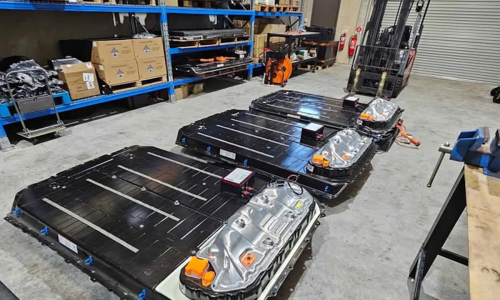$10,000 battery photo ignites alarm over hidden EV danger
By
Gian T
- Replies 0
As interest in electric vehicles and solar power continues to surge across the country, a new trend is gaining traction, though not without controversy.
Some energy-savvy Aussies are looking to repurpose old vehicle batteries for use at home, seeing it as a cost-saving and eco-friendly move.
But experts are sounding the alarm, warning that what seems like a smart solution could pose serious safety risks if not done properly.
With thousands of electric vehicles now on Australian roads, it’s no surprise that their batteries are starting to pop up in unexpected places, like Facebook Marketplace.
One recent listing from a Melbourne warehouse offered up large Tesla batteries for a cool $10,000 each.
The seller claimed these batteries, salvaged from written-off Tesla Model 3s, were 'ready to be used as a large solar storage battery' for off-grid or commercial use.
But when pressed for details, the seller was less than forthcoming, offering only a vague link to a lithium-ion battery business in Perth.
There was no paperwork, no guarantees, and certainly no manufacturer’s blessing.
It’s easy to see the appeal. With the cost of new solar battery systems still high, the idea of picking up a used EV battery for a fraction of the price is tempting.
Take Stefan Maric, for example—a Melbourne electrician who bought a written-off BYD Atto 3 for just $2,500 and used its battery to power a business site in Geelong.
With the right know-how, he was able to safely install the battery and has been running it for six months without a hitch.
But Stefan is quick to point out that this is not a job for amateurs. 'It’s still technically considered low voltage when you’re talking electrical terms, but you will die if you touch live conductors,' he warned.
In other words: don’t try this at home unless you really know what you’re doing.
Industry insiders are raising red flags about the growing 'cowboy' market for secondhand EV batteries.
Oscar Vall, commercial manager at InfinitEV (a company specialising in battery refurbishment), says the practice is 'not encouraged by the manufacturer and not encouraged by us.'
He points out that many DIY installers are bypassing critical safety features, putting themselves—and their properties—at risk.
'Ultimately, the battery is being used in an environment it wasn’t designed for,' Vall explains.
'There are a lot of safety implications of doing this, and I would definitely not like to be the insurer of the property that has a battery like that stuck on the wall.'
The risks aren’t just theoretical. Lithium-ion batteries can be dangerous if mishandled, with the potential for fires, toxic leaks, or even explosions.
And if something goes wrong, you might find your insurance won’t cover the damage.
It’s not all doom and gloom. Companies like InfinitEV are exploring ways to safely repurpose EV batteries for commercial energy storage, teaming up with organisations like Sustainability Victoria to create large-scale off-grid systems.
But even they admit that, for now, the economics and safety challenges make it a niche solution rather than a mainstream one.
As the EV market matures and more batteries become available, this could change. For now, though, most experts recommend sticking with purpose-built, certified battery systems—especially with the influx of affordable options from China and the generous government rebates now on offer.
If you’re keen to add battery storage to your home, you’re not alone. Aussies are installing solar batteries at record rates, with more than 19,000 registered monthly.
The federal government’s $2.3 billion Cheaper Home Batteries Program is making it easier than ever, offering rebates of up to 30% for new installations.
Federal Energy Minister Chris Bowen recently boasted that over 15,000 'cheaper' home batteries have been delivered in just four weeks since the program launched.
With so many safe, certified options available—and generous financial support—it’s never been a better time to upgrade your home’s energy system the right way.
Repurposing an old EV battery for home use might sound like a clever hack, but the risks far outweigh the rewards for most people.
Unless you’re a qualified electrician with experience in high-voltage systems, it’s best to leave this one to the professionals.
If you’re interested in battery storage, take advantage of the government rebates and choose a system that’s designed, tested, and certified for home use. Your safety—and your home—are worth it.

Have you ever considered using a secondhand EV battery for solar storage? Do you have experience with home battery systems, or are you thinking about making the switch? We’d love to hear your thoughts, stories, and questions in the comments below.
Read more: Will this proposal cut your energy bills dramatically? See the government's plans for solar batteries
Some energy-savvy Aussies are looking to repurpose old vehicle batteries for use at home, seeing it as a cost-saving and eco-friendly move.
But experts are sounding the alarm, warning that what seems like a smart solution could pose serious safety risks if not done properly.
With thousands of electric vehicles now on Australian roads, it’s no surprise that their batteries are starting to pop up in unexpected places, like Facebook Marketplace.
One recent listing from a Melbourne warehouse offered up large Tesla batteries for a cool $10,000 each.
The seller claimed these batteries, salvaged from written-off Tesla Model 3s, were 'ready to be used as a large solar storage battery' for off-grid or commercial use.
But when pressed for details, the seller was less than forthcoming, offering only a vague link to a lithium-ion battery business in Perth.
There was no paperwork, no guarantees, and certainly no manufacturer’s blessing.
It’s easy to see the appeal. With the cost of new solar battery systems still high, the idea of picking up a used EV battery for a fraction of the price is tempting.
With the right know-how, he was able to safely install the battery and has been running it for six months without a hitch.
But Stefan is quick to point out that this is not a job for amateurs. 'It’s still technically considered low voltage when you’re talking electrical terms, but you will die if you touch live conductors,' he warned.
In other words: don’t try this at home unless you really know what you’re doing.
Industry insiders are raising red flags about the growing 'cowboy' market for secondhand EV batteries.
Oscar Vall, commercial manager at InfinitEV (a company specialising in battery refurbishment), says the practice is 'not encouraged by the manufacturer and not encouraged by us.'
He points out that many DIY installers are bypassing critical safety features, putting themselves—and their properties—at risk.
'Ultimately, the battery is being used in an environment it wasn’t designed for,' Vall explains.
'There are a lot of safety implications of doing this, and I would definitely not like to be the insurer of the property that has a battery like that stuck on the wall.'
The risks aren’t just theoretical. Lithium-ion batteries can be dangerous if mishandled, with the potential for fires, toxic leaks, or even explosions.
And if something goes wrong, you might find your insurance won’t cover the damage.
It’s not all doom and gloom. Companies like InfinitEV are exploring ways to safely repurpose EV batteries for commercial energy storage, teaming up with organisations like Sustainability Victoria to create large-scale off-grid systems.
But even they admit that, for now, the economics and safety challenges make it a niche solution rather than a mainstream one.
If you’re keen to add battery storage to your home, you’re not alone. Aussies are installing solar batteries at record rates, with more than 19,000 registered monthly.
The federal government’s $2.3 billion Cheaper Home Batteries Program is making it easier than ever, offering rebates of up to 30% for new installations.
Federal Energy Minister Chris Bowen recently boasted that over 15,000 'cheaper' home batteries have been delivered in just four weeks since the program launched.
With so many safe, certified options available—and generous financial support—it’s never been a better time to upgrade your home’s energy system the right way.
Repurposing an old EV battery for home use might sound like a clever hack, but the risks far outweigh the rewards for most people.
If you’re interested in battery storage, take advantage of the government rebates and choose a system that’s designed, tested, and certified for home use. Your safety—and your home—are worth it.
Key Takeaways
- Some Australians are repurposing old electric vehicle (EV) batteries for home and commercial solar storage, but experts warn there are serious safety risks and it's not recommended for most people.
- The practice is currently considered a 'cowboy' space, with manufacturers and battery refurbishing companies cautioning that home set-ups can bypass important safety measures and void insurance.
- Although technically possible and very cost-effective for qualified professionals, using secondhand EV batteries in solar systems is not commercially viable at scale yet, but may become more common as more used batteries enter the market.
- With the federal government’s Cheaper Home Batteries Program driving a surge in certified home battery installations, most Aussies are better off using purpose-built and certified battery systems rather than experimenting with secondhand EV batteries.
Read more: Will this proposal cut your energy bills dramatically? See the government's plans for solar batteries








